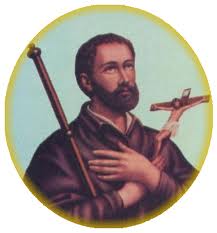 St. Francis Xavier was one of the great missionaries of the church. Like St. Paul he gave his life so that others may know the good news. As one of the original Jesuit priests who took their vows at Montmatre in 1534, he began his missionary work in 1541. From the outset, one of the priorities of the Jesuits was their commitment to preaching in foreign parts of the world. Thus 1541 found Francis sailing from Lisbon to Goa to preach Christ to the East Indies. Throughout his missionary life in South East Asia, Goa would be headquarters.
St. Francis Xavier was one of the great missionaries of the church. Like St. Paul he gave his life so that others may know the good news. As one of the original Jesuit priests who took their vows at Montmatre in 1534, he began his missionary work in 1541. From the outset, one of the priorities of the Jesuits was their commitment to preaching in foreign parts of the world. Thus 1541 found Francis sailing from Lisbon to Goa to preach Christ to the East Indies. Throughout his missionary life in South East Asia, Goa would be headquarters.
 Over the next ten years, for he died in 1552, his missionary travels and his work amongst Christ's people was phenomenal. His work started in Goa itself where he laboured to undue the oppressive life of the natives due to bad Christians. For most of the 1540's he preached in South India amongst the Paravas, in Ceylon, Malacca, the Molucca islands, and the Malay Peninsula. He truly was Christ amongst these people. Just as our dear Lord took our flesh in order to redeem us, so St. Francis lived as the poor in these countries. He ate what they did, which was mainly rice, slept often on the ground, and dressed in poor man's clothing.
Over the next ten years, for he died in 1552, his missionary travels and his work amongst Christ's people was phenomenal. His work started in Goa itself where he laboured to undue the oppressive life of the natives due to bad Christians. For most of the 1540's he preached in South India amongst the Paravas, in Ceylon, Malacca, the Molucca islands, and the Malay Peninsula. He truly was Christ amongst these people. Just as our dear Lord took our flesh in order to redeem us, so St. Francis lived as the poor in these countries. He ate what they did, which was mainly rice, slept often on the ground, and dressed in poor man's clothing.
 Tempered with this beautiful spirit, was his fervent belief, a belief common to all at that time, that the heathen were damned unless they were baptized. So there was always a sense of urgency, and perhaps at times a cruelty that does not fit his Christ-like approach. Like most Jesuits, he was fanatical in his thinking and condemnation of heresy; yet a legacy to him in this part of the world is that the Paravas have remained Christian.
Tempered with this beautiful spirit, was his fervent belief, a belief common to all at that time, that the heathen were damned unless they were baptized. So there was always a sense of urgency, and perhaps at times a cruelty that does not fit his Christ-like approach. Like most Jesuits, he was fanatical in his thinking and condemnation of heresy; yet a legacy to him in this part of the world is that the Paravas have remained Christian.
In 1649 St. Francis Xavier sailed to Japan where he translated into Japanese the fundamental beliefs of the Christian faith. Again he tried to adapt his way of living in order to enhance his preaching, and so he now dressed more lavishly so that he could impress the Mikado in Miyako. From his meeting of the Mikado he gained the use of an empty Buddhist monastery. From here, he set out on his numerous travels, and converted over two thousand to the Christian faith. So strong was their conviction that during the time of persecution that followed soon afterwards and the banning of Christianity by the end of the century there were still faithful Christians.
 After three years in Japan, he returned to Goa where he stayed for a short time before setting off for China. However en route he took ill, and died in very lonely circumstances on the island of Chang-Chuen-Shan. He was canonized in 1622 by Gregory XV, and in this twentieth century he was declared, most appropriately, by Pius XI in 1927 as Patron of the Foreign Missions.
After three years in Japan, he returned to Goa where he stayed for a short time before setting off for China. However en route he took ill, and died in very lonely circumstances on the island of Chang-Chuen-Shan. He was canonized in 1622 by Gregory XV, and in this twentieth century he was declared, most appropriately, by Pius XI in 1927 as Patron of the Foreign Missions.
 Whenever I think of this dear saint, I ponder on one of his prayers – a prayer that enshrines His love for God.
Whenever I think of this dear saint, I ponder on one of his prayers – a prayer that enshrines His love for God.
Not with hope of gaining aught,
Not seeking a reward,
But as You Yourself has loved me,
O ever loving Lord.
You, O my Jesus, did embrace
My sinful soul upon the Tree,
For me endured the pain, disgrace,
The nails, the spear, the mockery.
And griefs and torments numberless,
The sweat of agony,
Even death itself; and all for one
Who was Your enemy.
Then why, O blessed Jesus Christ,
Should I not love You well?
Not for the sake of winning heaven,
Nor of escaping hell.
Not for hope of earth's award
Your praises will I sing.
But solely that You are my God
And my eternal King.
